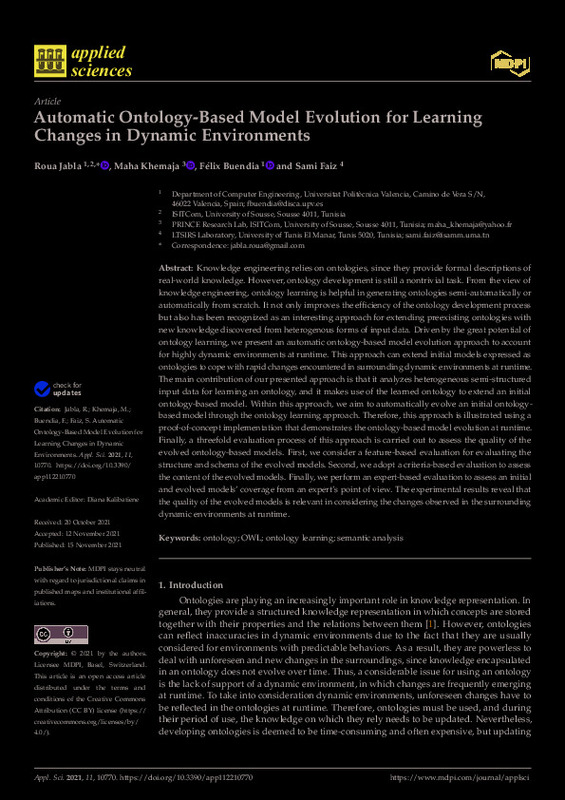JavaScript is disabled for your browser. Some features of this site may not work without it.
Buscar en RiuNet
Listar
Mi cuenta
Estadísticas
Ayuda RiuNet
Admin. UPV
Automatic Ontology-Based Model Evolution for Learning Changes in Dynamic Environments
Mostrar el registro sencillo del ítem
Ficheros en el ítem
| dc.contributor.author | Jabla, Roua
|
es_ES |
| dc.contributor.author | Khemaja, Maha
|
es_ES |
| dc.contributor.author | Buendía García, Félix
|
es_ES |
| dc.contributor.author | Faiz, Sami
|
es_ES |
| dc.date.accessioned | 2022-10-06T18:05:39Z | |
| dc.date.available | 2022-10-06T18:05:39Z | |
| dc.date.issued | 2021-11-15 | es_ES |
| dc.identifier.uri | http://hdl.handle.net/10251/187190 | |
| dc.description.abstract | [EN] Knowledge engineering relies on ontologies, since they provide formal descriptions of real¿world knowledge. However, ontology development is still a nontrivial task. From the view of knowledge engineering, ontology learning is helpful in generating ontologies semi¿automatically or automatically from scratch. It not only improves the efficiency of the ontology development pro¿ cess but also has been recognized as an interesting approach for extending preexisting ontologies with new knowledge discovered from heterogenous forms of input data. Driven by the great poten¿ tial of ontology learning, we present an automatic ontology¿based model evolution approach to ac¿ count for highly dynamic environments at runtime. This approach can extend initial models ex¿ pressed as ontologies to cope with rapid changes encountered in surrounding dynamic environ¿ ments at runtime. The main contribution of our presented approach is that it analyzes heterogene¿ ous semi¿structured input data for learning an ontology, and it makes use of the learned ontology to extend an initial ontology¿based model. Within this approach, we aim to automatically evolve an initial ontology¿based model through the ontology learning approach. Therefore, this approach is illustrated using a proof¿of¿concept implementation that demonstrates the ontology¿based model evolution at runtime. Finally, a threefold evaluation process of this approach is carried out to assess the quality of the evolved ontology¿based models. First, we consider a feature¿based evaluation for evaluating the structure and schema of the evolved models. Second, we adopt a criteria¿based eval¿ uation to assess the content of the evolved models. Finally, we perform an expert¿based evaluation to assess an initial and evolved models¿ coverage from an expert¿s point of view. The experimental results reveal that the quality of the evolved models is relevant in considering the changes observed in the surrounding dynamic environments at runtime. | es_ES |
| dc.language | Inglés | es_ES |
| dc.publisher | MDPI AG | es_ES |
| dc.relation.ispartof | Applied Sciences | es_ES |
| dc.rights | Reconocimiento (by) | es_ES |
| dc.subject | Ontology | es_ES |
| dc.subject | OWL | es_ES |
| dc.subject | Ontology learning | es_ES |
| dc.subject | Semantic analysis | es_ES |
| dc.subject.classification | ARQUITECTURA Y TECNOLOGIA DE COMPUTADORES | es_ES |
| dc.title | Automatic Ontology-Based Model Evolution for Learning Changes in Dynamic Environments | es_ES |
| dc.type | Artículo | es_ES |
| dc.identifier.doi | 10.3390/app112210770 | es_ES |
| dc.rights.accessRights | Abierto | es_ES |
| dc.contributor.affiliation | Universitat Politècnica de València. Departamento de Informática de Sistemas y Computadores - Departament d'Informàtica de Sistemes i Computadors | es_ES |
| dc.description.bibliographicCitation | Jabla, R.; Khemaja, M.; Buendía García, F.; Faiz, S. (2021). Automatic Ontology-Based Model Evolution for Learning Changes in Dynamic Environments. Applied Sciences. 11(22):1-30. https://doi.org/10.3390/app112210770 | es_ES |
| dc.description.accrualMethod | S | es_ES |
| dc.relation.publisherversion | https://doi.org/10.3390/app112210770 | es_ES |
| dc.description.upvformatpinicio | 1 | es_ES |
| dc.description.upvformatpfin | 30 | es_ES |
| dc.type.version | info:eu-repo/semantics/publishedVersion | es_ES |
| dc.description.volume | 11 | es_ES |
| dc.description.issue | 22 | es_ES |
| dc.identifier.eissn | 2076-3417 | es_ES |
| dc.relation.pasarela | S\450431 | es_ES |
| dc.contributor.funder | Universitat Politècnica de València | es_ES |
| upv.costeAPC | 2178 | es_ES |








